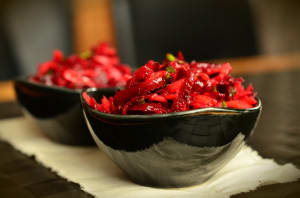The Best Ways to Eat Beetroot
Beets or beetroots are packed with nutrients to increase your energy and improve your athletic performance. However, if you don’t know what is the best way to eat beetroot you will not include it in your shopping list.
My friend Chad, a chef loves to try out new recipes on people so he invites his friends over to critic them. So last week he invited me to his placeto sample one of his new recipes. When I arrived at his place there was a sweet aroma coming from the kitchen so I followed it. When I discovered he was cooking beetroot I became skeptical about how it would taste but to my surprise it was delicious. I was so impressed that I requested the recipe to cook for my family. I never knew beetroot would taste so good. Now I’m on a journey to discover other ways of eating beetroot.
What are beetroots?

Image courtesy of pixabay.com
Beetroots have a vibrant red colour and are packed with loads of nutrients like Vitamin B, iron, potassium, and magnesium. Beetroot contains high levels of nitrates which when converted into nitric oxide has many health benefits. The nitric oxide helps increase blood flow to your body reducing your blood pressure, improving your cardiovascular health, reduce chances of heart disease, help improve your bowel movement and digestion, help fight inflammation, and improve our memory and learning. Beetroots are edible root veggies and they come in four types; table beet, golden beet, green beet, and the obvious one that you know the red beet.
Why should you eat beetroot?
Because of the high fiber content and low calories, beets can be the best veggie to eat if you want to lose weight. From a health perspective, people like beetroot because of the cardiovascular benefits you get. Beetroot is packed with high amounts of folate or Vitamin B9 which helps to lower the levels of homocysteine in your blood that is associated with heart disease. Eating foods rich in B Vitamins have many more benefits that are good for you.
What is the best way to eat beetroot?
Most people think that cooking beetroot will reduce health benefits. The nutrients found in beets are very heat sensitive so to preserve the nutrients and antioxidants avoid cooking the beets for a long time over a high flame. The beet also losses a lot of the folate when cooked over a high flame. Since Vitamin C is soluble, overcooking it will destroy it. Watch this for more ways of cooking beetroots. So, which is the best way to eat beetroot one might ask.
Boil
Wash the beetroots with the skin and prepare a bowl with ice water. Boil water in a large pot. Once the water has boiled, add in the beetroots. If you have beetroots with different colours, boil them in separate pots to avoid discolouring. Boil for 25-30 minutes until the skin can be easily removed. Remove the beetroots from the boiling water and put them in the ice water. Lastly dry and peel them. You can add them in your salads, juice them with greens, or as a side dish.
Raw
If you’re not a fan of the natural taste of beets, there are ways you can eat them. Ways that will add more crunch and colour to your meal. You can peel and grate the raw beets and use them in salads or making coleslaw. You can also make smoothies and add blueberries or raspberries. Another popular way of eating raw beetroot would be to make beetroot juice and spice it up with ginger and apples.
Roast or grill
Cooking the beets in an oven is a nice way of experiencing the earthy taste of beets. Roast the beets with the skin and peel it off when cooked. Slice it into cubes and add it to your salad, drizzle some olive oil or Himalayan salt and eat it as a snack.
Whichever way you cook beets they’re always tasty
You can refrigerate or freeze your beetroots in airtight containers to prolong their shelf life. Eating your beetroot raw is the best way of making sure you don’t lose the nutrients in the preparation process. You can also boil, roast or grill them. Whichever way you decide, be careful not to overcook the beetroots because the more the heat is applied the fewer nutrients and antioxidants are left. This also happens with other foods when you process them. And when handling beetroots remember not to wear your favourite dress if you don’t want to stain it.
FAQ
How much beetroot should you eat?
The recommended daily intake of nitrates is 0.06mmol per kg of body weight. So you calculate with your weight how many beets you need to eat.
Are beets better raw or cooked?
Raw beets have a mildly sweet taste, firm, and crunchy and you can juice them, add to your smoothie, or in salads. Raw beets retain their nutrients and preserve their natural flavour.
Does cooking beetroot destroy nutrients?
Cooking beets can cause a reduction in betalains because they are sensitive to heat. The time it takes to cook the beets plus the rise in temperatures reduces the vitamin C and betalains in the beets.
What are the side effects of eating beetroot?
A harmless side effect is red urine or poop after eating beetroot. Some other serious side effects would be bloating, constipation, stomach upset, and kidney stones.
Can you drink the water after boiling beets?
Yes, you can drink the water from boiled beets. After boiling the beets let the stock cool overnight before drinking it.